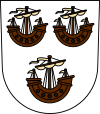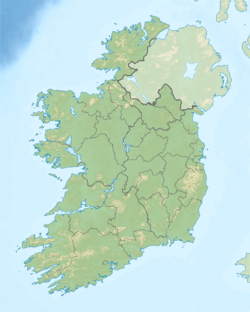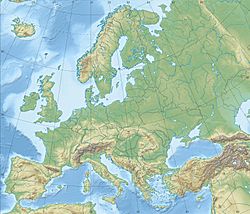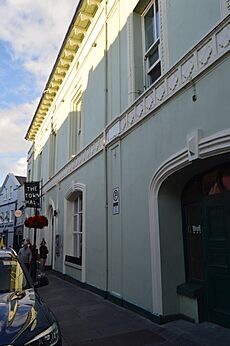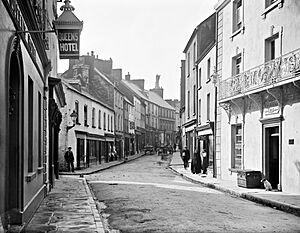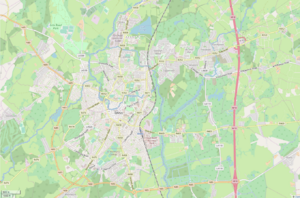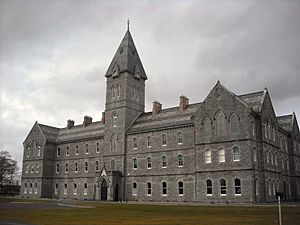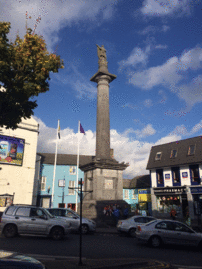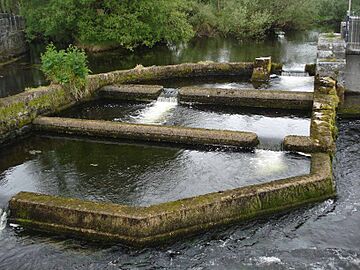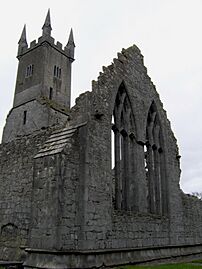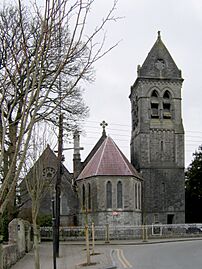Ennis facts for kids
Quick facts for kids
Ennis
Inis
|
||
|---|---|---|
|
Town
|
||
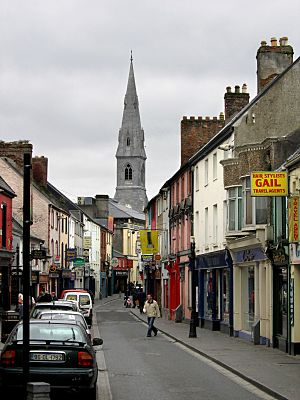
O'Connell Street, 2005
|
||
|
||
| Country | Ireland | |
| Province | Munster | |
| County | County Clare | |
| Baronies | Islands and Bunratty Upper | |
| Elevation | 3 m (10 ft) | |
| Population
(2022 census)
|
||
| • Rank | 11th | |
| • Urban | 27,923 | |
| Demonym(s) | Ennisman/Enniswoman | |
| Time zone | UTC±0 (WET) | |
| • Summer (DST) | UTC+1 (IST) | |
| Eircode routing key |
V95
|
|
| Telephone area code | +353(0)65 | |
| Irish Grid Reference | R333780 | |
Ennis (Irish: Inis [ˈɪnʲɪʃ]) is a lively town in County Clare, in the mid-west of Ireland. Its name means 'island' or 'river meadow' in Irish. The town sits on the River Fergus, just before it flows into the Shannon Estuary.
Ennis is the largest town in County Clare. In 2022, about 27,923 people lived there. This makes it the 11th largest urban area in Ireland. The town's Irish name, Inis Cluana Rámhfhada, means 'Island of the long rowing meadow'. This name comes from its location between two parts of the River Fergus.
Ennis has won the Irish Tidy Towns competition many times. It was named Ireland's tidiest town in 2005 and 2021. It has also won the award for Ireland's tidiest large urban centre several times.
Contents
- Ennis: A Town of History and Music
- Images for kids
- Famous Faces from Ennis
- Townlands and Parishes
- See also
Ennis: A Town of History and Music
The Story of Ennis: From Island to Town
The name Ennis comes from the Irish word "Inis," meaning "island." This refers to an island formed by the River Fergus. The town's history is closely tied to the O'Brien family. They were powerful kings of Thomond.
In the 12th century, the O'Briens moved their main home from Limerick. They built a fort called Clonroad Fort in 1210. This fort was a royal residence on the banks of the River Fergus.
The Franciscan Friary
In 1240, Franciscan monks came to the area. King Donnchadh O'Brien ordered a large church to be built for them. This church quickly grew into a major centre for religious studies. By 1375, it had 600 students and 350 monks living there.
As the Friary grew, so did the town around it. Ennis became an important religious centre. Even after it officially closed in 1540, the Friary continued to operate. It was one of the last Catholic theology schools to survive the Reformation.
Ennis Becomes a County Town
In 1586, Clare became a county under Queen Elizabeth I. Ennis was chosen as its main town and capital. This was because it was in the middle of the county. It also had strong links to the Earls of Thomond.
In 1610, Ennis was allowed to hold fairs and markets. Later, it received a special charter. This allowed it to have a local government with a Provost and other officials.
Growth and Challenges
Over time, many important buildings were constructed. These included the Mill and the Courthouse. The town also had old military barracks. Many local people served in the British Army during the First World War.
Ennis never had town walls because it grew from a monastery, not a fort. Instead, it became a place for buying and selling goods. Products were sent by river to Clarecastle. From there, they were shipped to other countries.
Local businesses included making clothes and milling corn and flour. They also brewed beer and made whiskey. You can still see signs of these old industries in the town. The Great Famine in 1845 greatly affected Ennis. The town's population dropped by over 20% due to hunger, sickness, and people moving away.
Local Government Changes
Ennis had its own local government from the 1600s. It sent representatives to the Irish Parliament until 1801. After that, it continued to have a voice in the British Parliament until 1885.
Over the years, the way Ennis was governed changed several times. In 2014, the town council was replaced. Now, Ennis is part of the Ennis Municipal District. It is managed by the Clare County Council.
The River Fergus
The River Fergus flows right through Ennis. It is a great place for fishing trout and salmon. In the past, small sailing boats could travel up the river. They would dock right in the town centre.
Some parts of the town used to flood often. But a new flood defence system has helped a lot. In 2009, a new bridge called Harmony Row Bridge was built over the river.
What Makes Ennis Special Today?
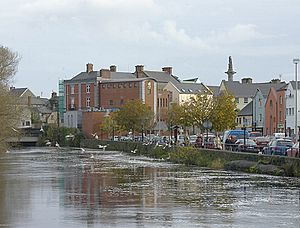
Ennis has continued to grow as a market town. It is also a centre for making and distributing goods. Many products are still sent by river to Clarecastle for shipping.
A Busy Market Town
Ennis is a historically important market town. You can still find market stalls every Saturday. They sell textiles, home goods, and organic farm produce.
The town centre has narrow medieval streets and lanes. Many buildings are hundreds of years old. Some main streets, like Parnell Street, are now for walkers only. The beautiful Cathedral of Saint Peter and Saint Paul is near the old town centre.
A Hub for Services
Ennis is a major centre for County Clare. It has important emergency services like Ennis Hospital. It is also home to the main offices for the Clare police and fire brigade.
The town also has many helpful groups like The Samaritans. Clare County Council, which runs the county, is also located here.
Music and Festivals
Ennis is well-known for Irish Traditional Music. Many musicians live and play here regularly. Since 1974, Ennis has hosted the Fleadh Nua every May. This is the second-largest traditional music festival in Ireland. Another festival, the Ennis Trad Festival, happens every November.
In 2016 and 2017, Ennis hosted the Fleadh Cheoil na hÉireann. This is a huge music competition. It was the first time the town hosted it since 1977.
Getting Around Ennis
Ennis is only about 14 kilometres from Shannon Airport. It has good bus and train links to other major cities and towns in Ireland. The main bus station is next to the train station.
Buses run almost every hour to places like Shannon Airport, Galway, Limerick, Cork, and Dublin. Shannon Airport offers daily flights to Europe and the USA.
The M18 motorway was extended to Ennis in 2007. This makes it easier to drive to Limerick. The section from Ennis to Gort opened in 2010.
Train Travel
Ennis railway station connects to Galway and Limerick. From Limerick, you can catch trains to Dublin, Cork, and other towns. Ennis was once the start of the West Clare Railway. This was a smaller train line that went to towns along the West Clare coast. It closed in 1961.
Learning in Ennis
Ennis has many primary schools. These include Ennis National School, Holy Family School, and Gaelscoil Mhichíl Cíosóg. There are also several secondary schools. Some of these are Rice College, Ennis Community College, and St. Flannan's College.
For older students, Ennis has further education options. Limerick IT opened a campus in Ennis in 2019. This college later became part of the Technological University of the Shannon: Midlands Midwest.
Sports and Fun in Ennis
Cusack Park is the main county Gaelic Athletic Association (GAA) grounds. It is home to Clare GAA. Ennis has many football clubs for soccer, GAA, and rugby. They play in different leagues for all ages.
Lees Road Sports Park
The Lees Road Sports and Amenity Park is a great place for outdoor activities. It is about 1 kilometre from the town centre. This park covers 134 acres of woods and parkland.
It has four playing pitches and an all-weather floodlit pitch. There is also a running track and a cross-country running track. The park has a playground, a skateboard park, and marked walking trails.
Leisure Centre and Clubs
Ennis Leisure Centre has a gym and a 25-metre swimming pool. Several hotels in Ennis also have their own gyms and pools.
The town has six adult soccer clubs, two adult GAA clubs, and one rugby club. This means there are many ways to get involved in sports!
International Friends
Ennis has "sister city" relationships with other towns and cities around the world.
- It is twinned with Phoenix, Arizona in the USA. Each summer, students from Ennis visit Phoenix as youth ambassadors.
- It is also twinned with Saint-Paul-de-Fenouillet in southern France.
- Ennis is twinned with Clare, South Australia and Clare, Michigan in the United States.
Ennis: The Information Age Town
In 1997, Ennis became Ireland's first "Information Age Town." This project brought a lot of new technology to the town. About 4,200 computers were given to residents. Every school got a computer lab, and every primary classroom received a computer. Older residents also learned how to use computers.
The project also gave Ennis Ireland's first high-speed internet infrastructure. This connected all the town's businesses. Ennis was also a test site for a new payment card system. The project's funding ended in 2000.
Tidy Town Awards
Ennis has won the Irish Tidy Towns Competition multiple times. It won in the Large Urban Centre category in 2012, 2013, and 2021.
Images for kids
-
Monument to Daniel O'Connell in O'Connell Square, where he won the Clare by-elections in 1828.
-
Fish ladder on the River Fergus which flows through Ennis.
Famous Faces from Ennis
Many notable people have connections to Ennis, including:
- Tony MacMahon, a famous Irish accordion player.
- Des Lynam, a well-known Irish TV presenter in Britain.
- Maeve Kelly, a novelist.
- Daniel O'Connell, a politician known as "The Liberator." He fought for Catholic rights.
- Maura O'Connell, a singer.
- Simone Kirby, an actress.
- Denise Gough, an actress who has won two Olivier awards.
- Mark O'Halloran, a screenwriter.
- Dara O'Kearney, an international ultramarathon runner and professional poker player.
- Harriet Smithson, an actress who was the first wife of French composer Hector Berlioz.
Townlands and Parishes
The town of Ennis is located across several civil parishes. These include Doora, Drumcliff, Kilraghtis, and Templemaley. Within these parishes are smaller areas called townlands.
Some of these townlands are:
- Doora: Ballaghboy, Bunnow, Gaurus, and Knockanean
- Drumcliff: Cahircalla Beg, Cahircalla More, Claureen, Cloghleagh, Clonroad Beg, Clonroad More, Drumbiggil, Drumcliff, Lifford, Loughvella, and Shanvogh
- Kilraghtis: Rosslevan
- Templemaley: Ballycorey, Cappahard, Dulick, Knockaderry, and Knockanoura
| Historical population | ||
|---|---|---|
| Year | Pop. | ±% |
| 1821 | 6,701 | — |
| 1831 | 7,711 | +15.1% |
| 1841 | 9,318 | +20.8% |
| 1851 | 7,843 | −15.8% |
| 1861 | 7,041 | −10.2% |
| 1871 | 6,503 | −7.6% |
| 1881 | 6,307 | −3.0% |
| 1891 | 5,460 | −13.4% |
| 1901 | 5,093 | −6.7% |
| 1911 | 5,472 | +7.4% |
| 1926 | 5,518 | +0.8% |
| 1936 | 5,897 | +6.9% |
| 1946 | 5,871 | −0.4% |
| 1951 | 6,097 | +3.8% |
| 1956 | 8,292 | +36.0% |
| 1961 | 8,410 | +1.4% |
| 1966 | 9,181 | +9.2% |
| 1971 | 10,840 | +18.1% |
| 1981 | 14,640 | +35.1% |
| 1986 | 15,547 | +6.2% |
| 1991 | 16,058 | +3.3% |
| 1996 | 17,726 | +10.4% |
| 2002 | 22,051 | +24.4% |
| 2006 | 24,553 | +11.3% |
| 2011 | 25,360 | +3.3% |
| 2016 | 25,276 | −0.3% |
| 2022 | 27,923 | +10.5% |
See also
 In Spanish: Ennis para niños
In Spanish: Ennis para niños
 | John T. Biggers |
 | Thomas Blackshear |
 | Mark Bradford |
 | Beverly Buchanan |


